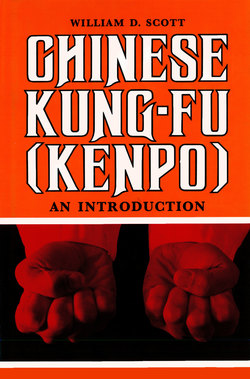Читать книгу Chinese Kung-Fu (Kenpo) - William D. Scott - Страница 7
На сайте Литреса книга снята с продажи.
ОглавлениеINTRODUCTION
You are about to undertake a training program in the ancient Chinese art of Kenpo (a Southern Chinese derivative of Kung-Fu). Unlike other works in the martial arts field, this book is not designed to turn you into a "killer" or totally self-protected individual. Instead, its aim is to take you through the first step of learning the art, a step that should realistically take about three months.
Through a program of exercise and practice, your body will become toned, your vigor increased and your confidence more assured. Women, men and children will find the regimen healthful and fun, as well as instructive. The exercises described in the appendices are basic gym-type exercises and are safe for those in average health.
Preferably, the study of Kenpo should not be undertaken alone. Find someone to work with you and each can alternate leading the workouts described in the lessons and appendices. The person running the "class" at a particular time is called the sensei (or master). Experts concur that learning the art in small groups is more fun and more instructive.
My philosophy is expressed by the Chinese characters on the title page — literally translated they read, "To Fight for a Peaceful Heart." In order to obtain harmony with the world, you must first achieve a working balance between your mind and body (a task begun with this book). Once this harmony is achieved, a harmony of a higher nature must be reached between you and your world. In this way you become closer to the Life Force (or God) and therefore closer to the Oneness of the universe.
A note on attire. At the beginning you may dress in loose-fitting clothing, but later you may wish to purchase a gi (the standard judo-karate outfit). Gis come in various colors and sizes and range from $15.00 to $25.00. You will be starting with a white belt (8th Kyu) denoting your rank, and it will usually come with the gi. Gis may be purchased from a local martial arts school, through a YMCA teaching a martial art and from various mail order houses, such as Honda Associates, Inc., 485 5th Avenue, N.Y., N.Y. 10017. It is important that you practice without shoes, as the feet are traditionally uncovered in the Chinese martial arts.
The Kenpo rankings ordinarily used in the United States are simple. The following chart provides all the knowledge you need:
STANDARD KENPO RANKINGS
| RANK | ATTACK TRAINING | ||
| 8th Kyu | — White Belt | ||
| 7th Kyu | — Orange Belt | One-man (unarmed) | |
| 6th Kyu | — Purple Belt | One-man (club) | |
| 5th Kyu | — Blue Belt | Two-man (club) | |
| 4th Kyu | — Green Belt | One-man (knife) | |
| 3rd Kyu | — 3rd Degree Brown Belt | Multi-man | |
| 2nd Kyu | — 2nd Degree Brown Belt | Multi-man | |
| 1st Kyu | — 1st Degree Brown Belt | Multi-man | |
| 1st Dan | — 1st Degree Black Belt | Multi-man (gun) | |
| Physically | 2nd Dan | — 2nd Degree Black Belt | Multi-man (gun) |
| Attainable | 3rd Dan | — 3rd Degree Black Belt | Multi-man (gun) |
| 4th Dan | — 4th Degree Black Belt | Multi-man (gun) | |
| Awarded for | 5th Dan | — 5th Degree Black Belt | |
| Contributions | 6th Dan | — 6th Degree Black Belt | |
| to the art | 7th Dan | — 7th Degree Black Belt | |
| 8th Dan | — 8th Degree Black Belt |
Each lesson teaches fundamental movements and defense techniques which should be practiced and memorized thoroughly. As you progress to the later lessons, more emphasis will be placed on learning the techniques.
Two lessons describe kata forms. These katas actually originated in Okinawa and are responses to simulated mass attacks under ideal situations. They teach fundamental movements as well as concentration, and should be worked on until they become polished.
Before starting a particular lesson, I recommend that you read it through first, studying the pictures in order to get some idea of what you will be learning.
I wish you good luck, and if you stick with the program, I'm sure that you will achieve Orange Belt — the first step toward better mind-body coordination.
